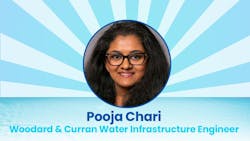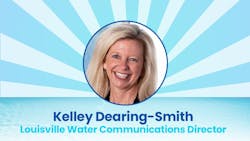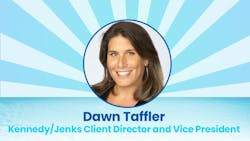March is Women's History Month, and to recognize this month, Wastewater Digest annually features some important and vital women in the water industry who are making a difference. This year features three woment from different backgrounds with influence and power in their respective areas of the market.
Pooja Chari is an active and important member of the American Water Works Association Young Professionals committee while also performing the important work of a wastewater engineer for Woodard & Curran. Kelley Dearing-Smith is one of the industry's leaders in communications with her position at Louisville Water where she directs communications while also serving as the Communication Committee Chair for AWWA. And lastly, Dawn Taffler is a crucial player in the water reuse and recovery space of the industry where she is active with WateReuse Association to advance this area of the market ever forward.
Reflect on their experiences with the below feature and consider the importance of the women who conduct water work around the nation.
- Bob Crossen, Editorial Director
Pooja Chari
Water Infrastructure Engineer
Woodard & Curran
Why water? Did water find you or did you find water?
I think water found me. I used to travel by train when I was in college in India. The train crossed a river, and every morning this river would be visibly polluted. The view used to upset me a lot. This river made me realize that I wanted to give back to the community by becoming an Environmental Engineer. This led me to where I am today, a Project Engineer with Woodard & Curran.
What about your current position excites you?
I get to work with clients from across the country! This leads me to believe that I am making a small mark here. My position does give me the satisfaction that in some small way, I get to make a difference.
What is the most important issue facing the industry to you, and what is your moonshot idea for addressing that issue?
I think one of the important issues our industry is facing right now is workforce. There is a big part of our workforce that is going to retire in the next few years, and we’re going to have more shortage. I think, we’re missing out on a resource with immigrants. Being an immigrant myself, I know how difficult it can be to navigate the system. If there was a way to ease the process, I know the water industry can attract a lot of talent!
What role has mentorship played in your career to date?
Mentorship has been integral in my career. I have mentors within my organization as well as outside. They have provided me with valuable guidance and opened doors for new and many a times rare opportunities.
What piece of media (books, TV shows, movies, games, podcasts, etc.) has had the greatest impact on you in the past 12 months?
I might be late in the game, but I read the book “How to Say Anything to Anyone” by Shari Harley relatively recently. I am in a place in my career where I am taking on more official leadership roles. This book talks about building business relationships. One of the most important takeaways for me is it is extremely important to have candid and honest conversations with people you work with. These conversations can not only help you perform well but also open opportunities for growth and advancement in your career.
What does it mean to you to be a woman who works in the water industry?
I moved to the U.S. as an international student; on top of that being a woman has been an interesting journey. There were several times where I have been the only woman, person of color, and youngest person at a table. I used to think it is challenging to be in this position. However, over time I realized that these are my strengths, and they help me bring a different perspective to the table.
Kelley Dearing-Smith
Vice President of Communications and Marketing
Louisville Water
Why water? Did water find you or did you find water?
Water definitely found me! In 1999, I was managing a large television newsroom and struggling with my career path. My husband and I were balancing demanding media schedules with a toddler who I didn’t see as much as I wanted. I happened to talk with someone at Louisville Water who mentioned they had a new communications position that I should consider. I must be honest; I knew nothing about drinking water. I took a chance, joined Louisville Water, and I like to say, “I drank the water” because I’ve stayed 25 years! When I started at Louisville Water in 1999, I doubled the size of the communications department (we grew from one to two people). Today, I’m a vice president, and my department has nearly 20 people who focus on brand journalism, content marketing, public affairs, community relations, economic development, and building the brand of our trademarked tap water, Louisville Pure Tap. My team even manages a museum at our 1860 original pumping station.
What about your current position excites you?
I’m part of the executive leadership at Louisville Water and that means communications is part of every discussion: affordability, water quality, engineering, customer service, etc. That’s exciting and in our sector, transformational. At my core, I’m curious, creative, and I love a good conversation. I’m a storyteller, and I use my journalism skills every day to make complex issues relevant and understandable to your grandmother, a politician, or a child. I thrive on big ideas and highlighting something most take for granted.
What is the most important issue facing the industry to you, and what is your moonshot idea for addressing that issue?
The water sector must change its attitude and think of itself as a brand and take charge of the narrative of what we provide — water is the anchor for public health and quality of life. Our lack of communications and branding means we’ve let others fill the void and tell the wrong story about water. Communications must have a seat at the table. That means viewing a strategic communicator as a professional — just as you would view an engineer or a scientist. Focus on branding and communications and we attract talent, funding, innovative solutions, and yes, we strengthen the public’s trust. My moonshot idea: A water communications think-tank. I want to make this happen!
What role has mentorship played in your career to date?
I have so many people who I consider part of my go-to group. Mentors have helped me define my work-life balance; pushed me to advocate for an idea or my profession; and grounded me when I needed to step back, pause, and listen. I’m so thankful for my group!
What piece of media (books, TV shows, movies, games, podcasts, etc.) has had the greatest impact on you in the past 12 months?
Last spring, I read While the World Watched by Carolyn Maull McKinstry. Four of Carolyn’s friends were killed in the 16th Street Baptist Church bombing in Birmingham in 1963. I read Carolyn’s book after touring the Civil Rights Institute that sits adjacent to the church; it was an experience that put knots in my stomach. Carolyn’s words and the vivid stories of race relations she shared had a lasting impact. I struggle to understand the tension and hatred that exists in our world; it was important for me to hear her story. My visit to the museum was part of AWWA’s Water 2050 initiative. Social issues are engrained in the water sector and although Carolyn’s book has a more personal meaning to me, the decisions decades ago still hurt so many today with access to drinking water, infrastructure and affordability.
What does it mean to you to be a woman who works in the water industry?
Louisville Water is a great place to work; it’s allowed me to be a mom, a wife and have an amazing career. When I was promoted to a vice president, a friend in the industry told me I’d broke the glass ceiling — communication and a female VP — at the executive level of a water utility. I hadn’t thought about the accomplishment in that way. Being a woman in this sector means I bring a unique perspective to the conversation. I’ve seen positive changes in how women are viewed — just as I see positive changes now in how we view younger professionals. I’m proud to think that I’ve carved a path for others to find a role in water. When I came to Louisville Water, my toddler Katie was 18 months. Today, I have two successful and brilliant daughters: Katie is 26 and Kortney is 22. They appreciate the value of water and of course, they are fanatic brand ambassadors for Louisville Pure Tap. Perhaps one day they might “drink the water” like I did and find a career in water!
Dawn Taffler
Vice President & Client Director
Kennedy Jenks
Why water? Did water find you or did you find water?
Back in high school, I was really good at math and physics, and I was a bit of a hippy, loving time on the rivers and hiking through the forests. My physics teacher told me I could save the environment with math and physics. I’ve been doing that ever since — gravitating toward water and recycled water, following my personal mantra of “saving the world one drop at a time.”
What about your current position excites you?
I’m a Vice President, Client Director, and Board member at Kennedy Jenks (KJ), and the most exciting thing about my current position is that we have an opportunity to tackle projects from a multidisciplinary perspective, all relating to One Water. These include drinking water, wastewater, storm water, recycled water, conservation, even desalination. There are only so many drops on this planet, and we must figure out: What is the right water for the right use? And how are we going to make sure we protect both public health and the environment?
What is the most important issue facing the industry to you, and what is your moonshot idea for addressing that issue?
In the face of climate change, every community needs to think about how it is going to diversify its supply. It takes a wide range of engineers, scientists, planners, and community outreach to be able to make that happen. My moonshot idea would be to discover a truly scalable approach for resource recovery of brine. We have the treatment technologies to address the removal of dissolved salts, pharmaceuticals and other constituents of concern through reverses osmosis, but we need a better way to deal with the reject water (e.g. brine). A multi-step approach to concentrate the brine to a solid and separate out reusable components in an energy efficient and cost-effective way would be a game changer.
What role has mentorship played in your career to date?
I am fortunate to have learned from multiple mentors throughout my career. In my early years at KJ, the best advice I got was from our CEO, Keith London, who advised me to narrow my focus on one area rather than spreading myself too thin. “Become the expert,” he said, “Be the go-to person for your passion.” So, I focused on recycled water and became KJ’s Community of Practice leader and served on the WateReuse California Board of Directors for eight years, which has been extremely rewarding. Along the way I have maintained strong relationships with those who have mentored me to develop my technical capabilities and business acumen. The key for me has been having open and ongoing conversations with my mentors to help me clarify my goals, navigate our business, and learn to cultivate strategies that consider long-term drivers and implications. A good mentor can be your guide at any stage of your career. Being a mentor is critical to the future of our field. Some of my most rewarding experiences as a mentor have been advising for KJ’s Women@KJ Employee Resource Group, serving on our Diversity & Inclusion Council, and presenting to schools, from elementary level to universities, to reach the next generation of engineers and scientists. Sometimes all it takes is just one conversation to spark someone’s interest in such a rewarding career.
What piece of media (books, TV shows, movies, games, podcasts, etc.) has had the greatest impact on you in the past 12 months?
My recent obsession has been the “What Matters Water Podcast” (https://socalwater.org/podcasts/) produced by the Southern California Water Coalition (SCWC), which presents engaging and timely conversations about water. Its kind of like the “rock stars” of California Water, talking about issues that impact all of our communities. Hosted by the incredible Charley Wilson, Executive Director of SCWC, who has a way of setting the stage for complex topics and teasing out the real issues in a way that is digestible for the non-water community. As an industry, it’s so critical that we reach outside our bubble to educate, inform, and get people engaged about the water issues that impact all of us. The “What Matters Water Podcast” does that. I will be a guest on an upcoming episode in March talking with Charley and other water leaders about direct potable reuse, which is the purification of wastewater to drinking purposes, a key to expanding our water resource portfolios.
What does it mean to you to be a woman who works in the water industry?
For me, personally, being a woman who works in the water industry means that I get to have an incredible impact on something so essential to public health and our communities. As an engineer, I think analytically and logically. As a woman, I bring emotional intelligence and a different viewpoint. As a mom, I excel in teamwork and multitasking. I have been successful as a woman in water by balancing technical skills with soft skills, using collaboration and communication to drive alignment. The future of water resiliency is going to require more than just technical abilities. We need to be able to bring people into the conversation. Our communities are diverse, and our industry should reflect that. I am encouraged by the diversity of engineers entering the field. It’s incredibly important for us to offer a seat at the table in our industry and provide them the opportunities to thrive — this can be achieved through training, DEI programs, mentoring and more.



